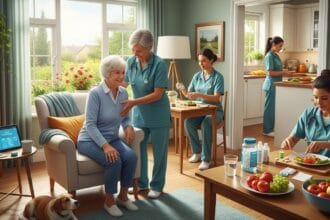There are a lot of health concerns that we face as we age. We have to worry about diabetes, arthritis, dementia and a variety of other health problems due to aging.
The National Council on Aging reports that 95% of people over 60 have at least one chronic health problem and 80% have at least two. This can be frightening for younger people that are worried about their aging parents. It can be particularly concerning if your parents are in a nursing home and you can’t monitor them as closely.
Nearly 1.3 million seniors live in nursing homes and they don’t always thrive there. Fortunately, there are still things that you can do to make sure they are healthy in a nursing home. You will need to check in regularly though to make sure that they are okay.
Why You Should Check-In
As our loved ones age, ensuring their well-being becomes a priority. For many families, assisted living facilities provide a solution that balances independence with necessary care. However, despite the peace of mind these facilities offer, concerns about the quality of care and the treatment of residents may linger. Checking on elderly family members in assisted living is not only an act of care but also a responsibility to ensure their safety and happiness.
The decision to transition a family member to assisted living is often complex and emotional. It’s a choice made with the belief that the facility will provide the support and attention that a loved one needs. While most facilities uphold high standards of care, instances of neglect or abuse can occur. Therefore, regular check-ins become crucial in maintaining transparency and accountability.
Common Tips
One of the most effective ways to ensure the well-being of a family member in assisted living is through consistent communication. Establishing open lines of dialogue with the resident and the staff fosters trust and allows concerns to be addressed promptly. Regular in-person or virtual visits provide an opportunity to observe the living conditions and assess the resident’s physical and emotional state. While routine visits are essential, they may not always reveal underlying issues. Changes in a loved one’s behavior or physical appearance can often signal problems that require attention. Be vigilant of any unexplained bruises, weight loss, or sudden mood swings. These could be indicators of neglect or abuse.
In cases where concerns persist despite communication and observation, it may be necessary to seek further action. Contacting the facility’s management to address specific issues is often the first step in resolving concerns. Most facilities have protocols in place to handle complaints and grievances, and they should be willing to investigate and address any issues raised.
However, if the facility fails to address concerns adequately or if there are suspicions of abuse or neglect, it may be necessary to seek legal advice. Elder abuse lawyers, such as Knapp & Roberts of Arizona, specialize in cases involving mistreatment or neglect of elderly individuals, including those in assisted living facilities. They can provide guidance on the appropriate steps to take and help navigate the legal process. When considering legal action, it’s essential to gather evidence to support your case. This may include documenting incidents of neglect or abuse, gathering witness statements, and obtaining medical records. An elder abuse lawyer can assist in gathering and presenting this evidence effectively.
Stay Informed
In addition to addressing specific concerns, staying informed about the rights and regulations governing assisted living facilities is essential. Familiarize yourself with the laws in your state regarding elder care and know what protections are available to residents. Knowledge of these rights empowers you to advocate effectively on behalf of your loved one.
Ultimately, checking on elderly family members in assisted living is about ensuring their safety, dignity, and quality of life. While most facilities strive to provide excellent care, it’s important to remain vigilant and proactive in monitoring their well-being. Regular communication, observation, and, if necessary, seeking legal advice are all crucial steps in fulfilling this responsibility.
Stand Up for Your Loved Ones
Staying involved and advocating for elderly family members in assisted living facilities is not only a responsibility but also a crucial act of love and compassion. By actively engaging in their care, we can help ensure that they receive the attention, respect, and dignity they deserve as they navigate their later years. Elderly individuals often face unique challenges as they age, including declining health, mobility issues, and cognitive changes. These challenges can make them more vulnerable to mistreatment or neglect, especially in settings where they may rely on others for their day-to-day needs. By staying involved in their care, we can help mitigate these risks and ensure they receive the support they need to thrive.
Advocacy plays a central role in this process. It involves speaking up on behalf of our loved ones, whether it’s addressing concerns with facility staff, advocating for policy changes to improve elder care standards, or seeking legal recourse in cases of abuse or neglect. By advocating for our elderly family members, we can ensure that their voices are heard and their rights are upheld.










